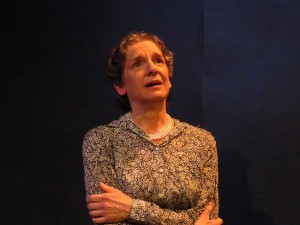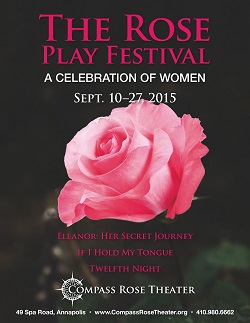Google Eleanor Roosevelt, if you look at the Wikipedia page, or the White House history page or even your history book in school, you will learn quickly that she was the longest-serving First Lady. She served as First Lady during her husband President Franklin D. Roosevelt’s four terms as president (1933-1945). Yet there is so much more to Eleanor than the history books and articles will tell you, even today as historians begin to reexamine the role Eleanor played in the White House and politics most people do not realize what an effect she had on women in the U.S. as a whole. Compass Rose Theater’s production of Eleanor: Her Secret Journey, written by Rhoda Lerman, and Directed by Rick Wade will open your eyes and enable you to explore the woman behind the politics, behind the facade, and behind the husband to discover a powerful woman who made difficult choices based on life experiences, knowledge, and wisdom.
This one-woman show is a tour-de-force for actress Sue Struve who truly shines in the role of Eleanor Roosevelt. Poised, prim, and perfect as the Eleanor many know and picture from history, Struve is able to show the breaks in Eleanor’s skin, the softness in her heart, and the pain in making decisions when needed. She is able to show emotions and distress and revert to that known polished character flawlessly when needed in the show. Lerman’s writing is a discussion on tradition versus change and enables Struve to show that struggle throughout the play.

Opening with a phone call from current President Harry Truman, Eleanor is asked to make a decision, to step back into the spotlight, help her government and help the world. Eleanor agrees to think about it and hangs up the phone, this begins a journey back through what has happened over the past years as Eleanor explores what she should do and why she should do it. Eleanor, never interacting with another individual on stage, confronts her husband’s picture and recollects on the war to end all wars and how it changed her, her family and history.
Struve seamlessly speaks as Eleanor and as each of the individuals she remembers, from her husband to the soldiers and women in the Red Cross canteen in Union Station. Struve transforms subtlety into each character as Eleanor reflects on conversations and situations that shaped and influenced her life. As the story progresses Eleanor confides in companions both male and female of the struggle to do what is right and needed and is given advice such as “giving not taking,” “you will change history if you change yourself,” and more importantly questions to ask herself: “where does your duty lie?” In the end the examination of the past, of World War I and its aftermath in France that she witnessed, Eleanor decides to help President Truman, and as history tells us she becomes a delegate to the newly formed United Nations and becomes known for her fight for Human Rights.
Director Rick Wade’s selection of Struve as Eleanor is the work of a great director. Talent like Struve is hard to find and this appears to have been a match to make great theatre. Wade’s direction of Struve is successful in the creation of Eleanor, the subtleties in which she handles Eleanor and the other characters throughout the production. This is also true of Wade’s use of staging and the way in which various set pieces are used. Set pieces and props crafted by Joann and Mike Gidos work well to set different locations on the small and intimate stage without making it feel overcrowded or making the pieces feel underutilized.
Though the acting is superb and Wade’s direction of Struve is genuinely creative, there are areas where the production needs work. The use of projection, though appropriate pictures, lacks coherency and is often difficult to see. The small projection screen adds a white box to the center of the stage above the head of Struve throughout the production and though black and white photos of appropriate moments are projected at the right time, many times they are difficult to see and take too much time to determine what they are and why they are there. One example of this was the photo of what appears to be soldiers in the field when Eleanor is reflecting of visiting France and seeing the aftermath. The picture was obscured and did not fit in with what Eleanor was talking about at the time. She was discussing seeing the destruction, bodies, and limbs not men in the field, yet the black and white photo was of one soldier carrying another through a field, but it was difficult to initially ascertain that this was in fact that image.
Another example of the odd use of projections was when Eleanor was discussing the creation of candles after the war. Burning candles appeared on the screen and then the picture zoomed in on the candles, but the projection went beyond the screen and onto the walls this causing the image to feel disjointed and inappropriately placed in the production. Even though I am a big fan of technology and projection in theatre productions, in the end even the good projections such as Truman (seen near the top of the show) and Eleanor (near the show’s end) seemed unnecessary and difficult to properly implement with a front projection and lighting that didn’t work well with the projector. The use of the audience’s mind and imagination was more effective during other aspects of the show where they chose not to use projections and that should have been continued throughout.
The simple lighting was nicely done to give a general wash to the stage though there was noticeably a lack in the changing of lighting throughout the performance. The one exception was an awkwardly placed blackout that stopped the momentum during the scene that took place in the Red Cross Canteen in Union Station. There also was a very nice moment where Struve, who was portraying one of the many influences in Eleanor’s life, came down to the front of the stage and then took two steps down toward the audience and out of the light. The impact of Struve’s movement was powerful and purposeful yet was almost lost without light to enhance her location.
Struve was in one costume for the duration of the play, a simple blouse/skirt combination with pearls that was appropriate for the end of the 1940s. Costume Designer Renee Vergauwen paid homage to Eleanor, the late 1940s, and Struve’s natural figure in creating this simple yet elegant outfit.
Sound Design, or lack-there-of, gave me pause to think. There was no preshow music which enabled this audience member to hear conversations coming from backstage while waiting for the production to begin. Furthermore, to enhance the story as was already done through the use of projections, the addition of sound effects or music would have helped to set the memory flashbacks. Finally, the only music in the show (featured at the end) seemed out of place. With no music before or during the performance, the ending music almost seemed wrong and forced as it played while the image of Eleanor Roosevelt later in life was projected onto the screen. Technically the show has some aspects that needed improvement but that does not give this reviewer a reason not see the show again.
In the end, this is the story of one woman who changed herself and history. A great woman who was ahead of her time, Eleanor Roosevelt is a First Lady that all of America should be proud of and should remember for everything that she did to help this country and human rights. Eleanor: Her Secret Journey is a well-written play about this amazing woman with an unbelievably talented actress portraying Eleanor. Together Struve and Wade take Lerman’s words and create a powerful and memorable piece of theatre in the intimate space of Compass Rose Theater.
Running Time: Approximately 65 minutes with no intermission
Eleanor: Her Secret Journey plays through September 27, 2015 in rotating repertory as a part of The Rose Play Festival in conjunction with the Women’s Voices Festival at Compass Rose Theatre— 45 Spa Road in Annapolis, MD. For tickets call the box office at (410) 980-6662 or purchase them online.

